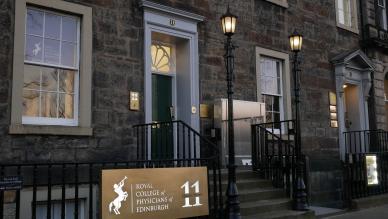

Our call for air quality monitors at all urban Primary Schools in Scotland
13 April 2023
The Royal College of Physicians of Edinburgh (“the College”) is calling for air quality monitors to be placed at all city primary schools in Scotland for a period of at least a year.
The College’s Working Group on Air Pollution and Health made the recommendation to the Scottish Parliament’s Net Zero, Energy and Transport Committee in response to a call for views on air quality issues.
The College believes that the placing of air quality monitors at all urban primary schools for at least a year will help provide measurements of air quality in the most comprehensive way and avoid results being confounded by seasonal variation in pollution.
There is currently a lack of data on air quality around schools, yet we know that air pollution can pose serious health risks to children – including lung disease and asthma.
After this work is completed for primary schools, the College considers that the process should be replicated at the country’s secondary schools.
Commenting Professor Andrew Elder, President of the Royal College of Physicians of Edinburgh and Co-Lead of the Working Group on Air Pollution and Health, said:
The evidence that air pollution harms the health of our school children, and that as a population cohort they are particularly at risk from that harm, is overwhelming. The negative health impacts of air pollution on children include problems with the lung, heart, brain and immune and hormonal systems. Furthermore, we are extremely concerned that the country’s least well off children often live in the areas of highest air pollution – this can only exacerbate the pre-existing health inequalities we all want to end.
Our current understanding of air quality levels at all the country’s primary schools is relatively limited with 24 hour average level data not being published and many schools simply too far away from networked air quality monitors. We consider that robust data is required as a priority so that mitigation measures around schools where air pollution is above guideline levels can be introduced without delay.
The College hopes that the Net Zero, Energy and Transport Committee will support our recommendation and press the Scottish Government to help protect children’s health by ensuring Scotland has the most effective air quality monitoring systems in place for our schools.
Prof Jill JF Belch FRCP Edin, Head of the Institute of Cardiovascular Research, Professor of Vascular Medicine & Honorary Consultant Physician NHS Tayside and the other Co-Lead of the Working Group on Air Pollution and Health, said:
Our children are our future, but are hugely susceptible to the harmful effects of air pollution. They have larger lung to body size, are outside more, and they are very vulnerable to toxins. Furthermore, they walk and run closer to exhaust pipes and emissions. We know that air pollution can affect every system in their body from lungs, to brain, skin and gut, producing damage which could affect the rest of their lives.
It is also an issue of inequality as some of the inner city schools have children from areas of deprivation, where their parents may not have a car, but yet these children are subjected to life altering poisonous particles and gases. Our own study in a Scottish Region has shown a significant increase in children being admitted to hospital on days of high pollution compared to when the levels are lower. We must protect them from this poisonous air.
Scotland has some of the best air quality laws in Europe, but pockets remain, and we must make sure our children are safe. Many city schools are not near current air quality monitors, so how do we know what our children are breathing in? The first step is to determine this, the second is to fix air quality where needed. Much can be done once we know there is a problem. At present we do not even know, and are risking our children’s future through lack of data. It is for this reason we are asking the Parliament’s Net Zero Energy and Transport Committee to consider this initiative.







